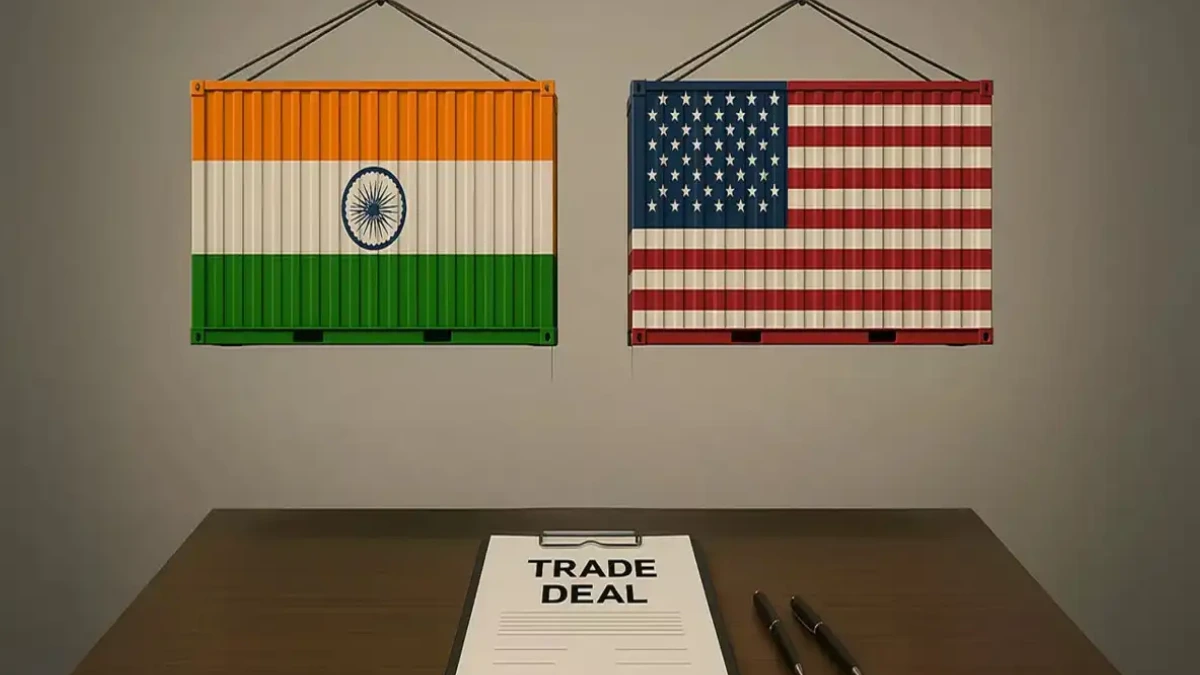
A prominent economic think group has warned of the dangers that could arise as India continues to negotiate a bilateral trade deal with the US. Policymakers in India have been warned by the Global Trade Research Initiative (GTRI) not to make the same mistakes as Indonesia, which just signed what the group refers to as a “one-sided” trade agreement with Washington.
According to a report issued on Wednesday, GTRI listed a number of issues with the U.S.-Indonesia deal and implied that India would be subjected to similar pressures or offers. The report exhorts Indian negotiators to put long-term economic security, justice, and transparency ahead of short-term gains.
Indonesia’s Trade Deal: A Cautionary Tale

The trade deal between the United States and Indonesia is a warning to developing nations, according to GTRI. The agreement gives U.S. exports, including tech, industrial, and agricultural items, almost total access to Indonesian markets by requiring Indonesia to remove 99 percent of its duties on American goods.
The U.S. has agreed to lower its duties on Indonesian exports from 40% to 19% in exchange, but GTRI claims that this still disadvantages Indonesia. It contends that the disparity is proof of Washington’s vigorous pressure, which produced terms that were extremely advantageous to American interests.
According to the paper, “the trade deal agreement between the United States and Indonesia is a classic example of how aggressive U.S. negotiating strategies can tilt agreements unfairly.”
Trump Media Reveals $2 Billion in Bitcoin Holdings as Part of Bold Crypto Strategy
Billions Committed to U.S. Products

As part of the trade deal, Indonesia has committed to purchasing $22.7 billion worth of American goods, including:
- $15 billion in energy imports such as crude oil, petrol, and liquefied petroleum gas
- $4.5 billion in agricultural goods, including soybeans, wheat, and cotton
- $3.2 billion in purchases of Boeing aircraft
Additionally, the agreement mandates that Indonesia discontinue its local content regulations, which formerly guaranteed that a certain percentage of domestically produced goods had components acquired locally. Since U.S. companies would now directly compete with Indonesian SMEs without any safeguards, GTRI warns that this shift could have a negative impact on the country’s SMEs.
National security and transparency issues are raised by the agreement’s lack of a requirement for American businesses to reveal whether their supply chains contain inputs from nations like China.
European Union Considers Broader Countermeasures as US Trade Talks Stall
Regulatory Imbalance in Vehicle and Digital Sector

The pact’s included regulatory norms are another matter of worry. American automakers can now sell their cars in Indonesia without any modifications as the country is required to accept U.S. automotive safety and pollution regulations. To export to the US, Indonesian automakers must still adhere to stringent US restrictions.
The agreement also allows remanufactured goods, or reconditioned or used items like electronics and industrial machinery, to enter the Indonesian market. GTRI contends that by oversupplying the market with low-cost substitutes, this could hurt indigenous manufacturing sectors, particularly in the capital goods and engineering industries.
Trump Criticizes Judge in Harvard University Case, Threatens to Slash Billions in Funding
Implications for India: Same Playbook

The report suggests the U.S. may be looking to use similar strategies in its trade talks with India. Proposed measures include:
- Opening India’s agriculture and dairy sectors
- Allowing imports of genetically modified animal feed
- Relaxing digital trade rules and product safety standards
- Weakening data privacy and local industry protections to align with American preferences
“These changes could drastically alter India’s approach to food safety, digital privacy, and economic self-reliance—they are not just regulatory fine print,” GTRI cautioned.
President Donald Trump Urges Washington and Cleveland Sports Teams to Restore Original Names
Trump’s Trade Agenda: Reciprocity and Pressure

Under U.S. President Donald Trump, who came back to office emphasising “fair trade,” Washington has started to negotiate bilaterally more rigorously. In 2025, his government brought back reciprocal tariffs, which mandate that U.S. trading partners provide equal market access or pay corresponding tariffs.
After a 90-day grace period, the U.S. levied a 10% baseline tariff on imports from nations that did not comply with its trade policies in April. India is under pressure to strike an agreement or risk higher tariffs when that deadline ends on August 1.
Trump has made it clear that the United States will no longer put up with trade imbalances, claiming that it will match or even surpass any tax imposed on it. This has made the ongoing trade talks between the United States and India even more urgent.
India Urged to Exercise Caution in Trade Talks with US Amid Rising Global Tensions
High-Stakes Talks in Washington

In response to these developments, a senior delegation from India’s Ministry of Commerce and Industry is in Washington, D.C. for high-level trade talks. The goal: to finalize a deal before the August 1 deadline while defending India’s core economic interests.
GTRI emphasized that India must not be rushed into an agreement without a full cost-benefit analysis, particularly in sensitive sectors like health, agriculture, technology, and intellectual property.
“India should only enter into trade deals that are balanced and mutually beneficial,” the report concluded. “Making short-term concessions for immediate gains could lead to long-term economic vulnerability.”
